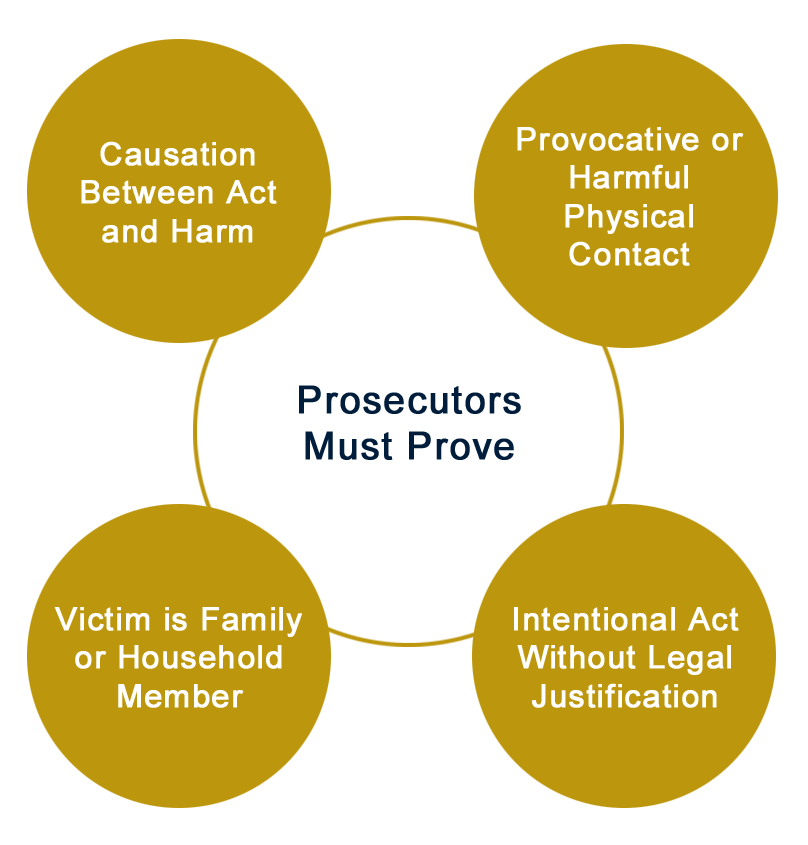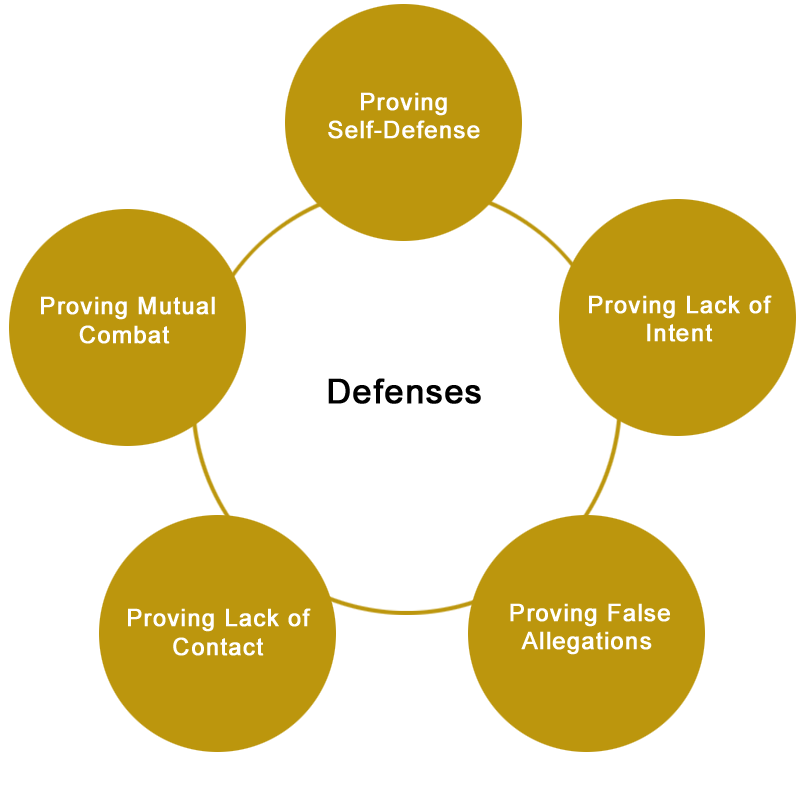As outlined in Georgia code OCGA § 16-5-23, Simple Battery occurs when a person, “Intentionally makes physical contact of an insulting or provoking nature with the person of another; or Intentionally causes physical harm to another.” When an incident occurs between family members or those who share a household, it is considered Simple Battery (Family Violence). These family relationships cover a wide range including ex- or current spouses or romantic partners, parents, stepparents, children, stepchildren, siblings or other household members.
Even the slightest contact can possibly lead to Simple Battery (Family Violence) charges as long as it is intended to intimidate or provoke. It could be a husband shoving his wife, a parent taking physical discipline too far, a dispute between exes, two siblings fighting or simply a roommate throwing a drink at another roommate. Any of these acts could result in jail time as well as fines, probation and/or court-ordered intervention.
 What Prosecutors Must Prove
What Prosecutors Must Prove
In order to secure a conviction in a Simple Battery (Family Violence) case, the prosecution must prove several factors beyond a reasonable doubt.
- That the defendant made physical contact of a provocative or insulting nature.
- That the defendant did so intentionally and without a legal justification such as self-defense.
- That the defendant’s alleged actions caused physical harm to the victim.
- That the alleged victim is a member of the defendant’s family or household.
This can often prove challenging for prosecutors, as Simple Battery (Family Violence) can often be an unfortunate misunderstanding, either on the part of those involved or the police. Charges can be based on exaggerated claims, inadequate or inaccurate information, or can be overstated due to the pressure on law enforcement to act quickly. They also need to prove physical contact, which is made more difficult if there is no visible injury or credible witnesses.
An experienced attorney can make it even more difficult for the prosecution by highlighting issues with evidence, questioning the testimony of law enforcement or showing where the prosecution’s case has inconsistencies. By undermining the prosecution’s case, an attorney could have charges reduced, dismissed, or resolved through other sentencing options and keep their client’s criminal record clear of convictions.
 Consequences of Simple Battery (Family Violence)
Consequences of Simple Battery (Family Violence)
A conviction of Simple Battery (Family Violence) can have myriad long-term consequences. Those convicted of a first offense could face up to a year or longer in jail, fines of up to $1,000 along with court costs, and mandatory completion of a 24-week Family Violence Intervention Program (FVIP). If the offender has a prior conviction, or if the victim’s injuries are especially grievous, the charges can be upgraded to Aggravated Battery (Family Violence), Aggravated Assault (Family Violence) or Strangulation (Family Violence), all of which are felonies.
Beyond jail time and fines, there are other consequences that could result from a conviction. The court may issue a Temporary Protective Order (TPO), denying the offender the ability to contact the victim or approach their home, workplace or school. This temporary order can be extended to three years or longer if needed, and any violations could lead to further criminal charges including felony Aggravated Stalking.
A conviction could also impact child custody and parental rights, resulting in court-supervised visitation or loss of custody. In more severe cases, a second conviction within a span of five years could potentially lead to revocation of parental rights.
Under Federal law (18 U.S.C. § 922(g)(9), any conviction for Simple Battery (Family Violence), even a misdemeanor, results in an automatic lifetime ban from owning a firearm, with offenders being required to surrender their guns.
On top of all that, those convicted could be placed on probation or required to perform community service. They could be compelled to attend anger management, batterer’s intervention, behavioral therapy, or drug and alcohol counseling with random screening. They may be required to pay restitution for the lost wages, property damage or medical expenses the victim incurred. Non-U.S. citizens could face deportation. The presence of a conviction on their record could impact their employment or ability to apply for professional licenses.
 Defending Against Simple Battery (Family Violence) Charges
Defending Against Simple Battery (Family Violence) Charges
Being charged with Simple Battery (Family Violence) does not necessarily mean you will be convicted. The onus is on the prosecution to prove guilt beyond a reasonable doubt, providing multiple avenues for a skilled attorney to have charges reduced, dismissed, or acquitted. A few of these include:
Proving Self-Defense: Arguing that you only acted to protect yourself, for example if your partner attempted to strike you and you pushed them to avoid it.
Proving Lack of Intent: As a conviction requires the act to be intentional, you could show how the contact was accidental, like bumping into someone.
Proving False Allegations: It is not uncommon during already contentious family court cases or particularly bad breakups for one person to fabricate claims of assault, either to gain an advantage in court or as punishment.
Proving Lack of Contact: Without any witness testimony or physical evidence of harm, such as bruises or other injuries, the prosecution cannot prove the accusers’ claims.
Proving Mutual Combat: Sometimes a physical altercation is a two-way street, and proving that both parties were equally at fault in the incident can lead to dismissal.
How The Turner Firm Can Help
At The Turner Firm, it is our steadfast goal to keep your record clear of a criminal conviction, seeing your charges reduced, dismissed, or acquitted. We achieve that goal through a robust defense informed by our own exhaustive independent investigation into the facts of your case. We review every bit of evidence, from test results and court documents to bodycam footage and audio/video recordings. We return to the scene, scouring it for details that prove your innocence. We challenge the official record created by law enforcement, questioning every aspect. We file motions that ensure that illegally obtained evidence never makes it to court.
This vigorous defense of your rights begins with a free, no-obligation legal consultation in which we’ll discuss your case under attorney-client privilege, letting us hear your side of the story, answer your questions, and establish the facts. With the facts in hand, we’ll craft a defensive strategy unique to your case, tailor-made to keep your record clean. And we’ll establish a quote for our services with no pressure on you to commit to working with us. Don’t let one incident destroy your entire future. Call us today to schedule your free evaluation.
